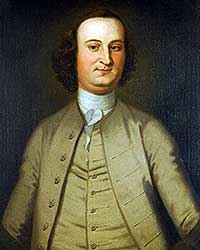
Fielding Lewis was born into a prominent in Warner Hall, Gloucester, Va. in 1725. Fielding followed his father John Lewis to Fredericksburg who in 1746 who saw possibilities in the developing Fredericksburg economy. Earlier his father purchased 409 acres from Francis Thornton on the northern boundary of Fredericksburg. This is what is today Lewis St, Fauquier, Hawke and more. John Lewis built a store, warehouses, and a shipyard. (The Lewis store of 1749 at the corner of Lewis and Caroline stands today, a story and half Georgian building).Fielding came to apprentice in his father’s businesses and worked in the Lewis store.
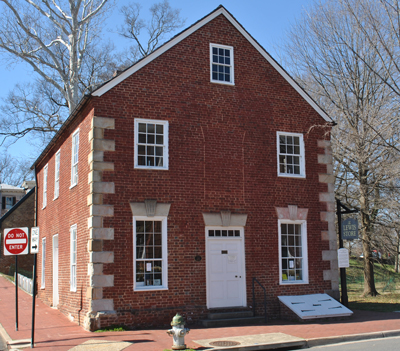
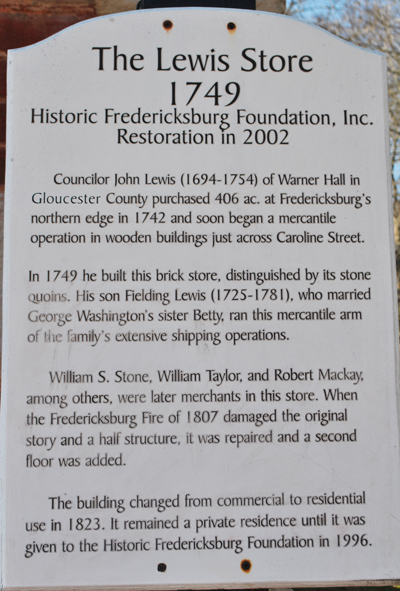
His father built a home in 1747 on what is today 1201 Princess Anne Street, today across from the Kenmore Inn. It became Fielding’s home for his first wife Catherine. That home was burned in 1807 but the current home erected on the same site is similar and was built in 1817. It is a 3 bedroom, 6,000 square foot house containing 12 rooms. Catherine died in childbirth in 1750.
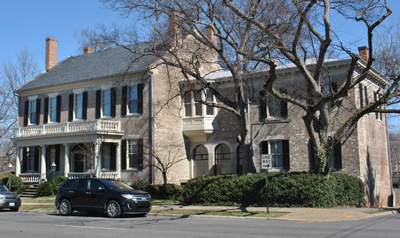
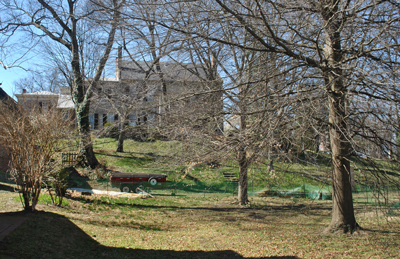
But as was a custom of the time, he soon remarried 17-year-old Betty Washington. Betty was first cousin of Catherine and 2nd cousin of Fielding and George Washington sister. She gave birth to 11 children with Fielding Lewis.
Fielding took a major role and extended his father’s property by purchasing the adjacent Royston property of 861 acres in March 1752 which brought the size of both properties to approximately 1,280 acres. Upon his father’s death in 1754, Fielding inherited the business and plantation. It was at that time he would begin creating Kenmore a similar home to what was seen in Tidewater Virginia. His day to day business was that as a merchant who acquired substantial lands, typical for the time. He built stores, wharves and warehouses.
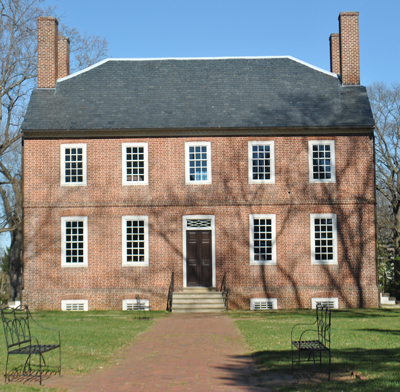
As was the case with the landed gentry, Fielding took up leadership roles in both the government and church. He served in the House of Burgesses, twice from 1760 and 1770. However, his role at St. George’s was more extensive.
What type of role did Lewis play in Fredericksburg? Paula Felder wrote the following in her book Fielding Lewis and the Washington Family. “It was Fielding Lewis’ moderation that would serve the county well. His integrity and quiet demeanor helped on specific occasions to contain the fractious factions in both church and court politics”
Felder goes on in a later book Forgotten Companions to provide an assessment of his leadership – “He was not a charismatic leader; rather he was a diligent and committed person who assumed that leadership was an inseparable part of his social rank.“ and “His skills seen to have ben those of a manager and arbiter rather than an individual arbiter of good.”
His weakness was inattention to details or at least an ability to handle the wide scope of his affairs. He had a “total disinterest or ineptitude in the management of his papers” as Felder writes. Sales were not recorded or had the wrong information or in some situations had no descriptions. He may have devoted himself to certain tasks and ignored others. During the Revolutionary war he put all of his energy into the gun manufacturer business to the detriment of his health and finances. He was not reimbursed by the government for more than 2 years of personal expenses. He had to sell property to keep his enterprise afloat and his debt fell to later generations. Felder speculates that his financial problems went back to the creation of Kenmore and the enormous expense of running that operation.
Lewis served off and on in the St. George’s Vestry for 26 years from 1753 to 1779. The Vestry played a key financial role in Colonial Virginia as it was responsible for the levy – which was a required donation from every person so the Vestry could pay people for tasks. He was appointed warden at least 4 times – 1754, 1768, 1772 and 1779 – a leadership position. The Junior warden was intended for beginning Vestry membrs.
The warden collected fees and taxes which paid the minister and covered the expenses of the parish. They certified the levy payment and accuracy of the tithables, the number of families to pay the tithe. They were the eyes and ears of the court and responsible for wrongdoers reported to the court. Finally, they were part of the welfare system of the county –feeding the hungry and making sure the poor and abused had housing. In 1662 parish vestries were assigned the task of providing for the indigent in general.
He was closer to the Junior Warden today dealing with necessary repairs of the church
-1756. hiring someone to paint the Rappahannock Church and number the pew
-1757.Erecting galleries in the Rappahannock and Pamunkey churches
-1757. selling glebe land
-1770. served on a committee to make the Necessary Repairs to the Fredericksburg Church and to Erect a Gallery in the new addition”
Some of his tasks would be delegated to the Senior Warden in today’s church
-1770-1773. He see sold the graveyard lands down to Caroline Street and look to purchase property elsewhere
-1770. Part of the Vestry Order Church wardens purchase 100 acres “convenient to the new church” for the “use of the Poor and that they Erect Necessary Buildings theron”
-1772. As a warden he was ordered to sell land “to purchase the square of land and railing in the church yard.” The square of land may refer to 4 lots in what is today Hurkamp Park
-1773. The Vestry allocated 100 pounds of tobacco for a “Square of lotts” purchased to “Erect a new Church upon”
-1773. The Vestry resolved make application to the General Assembly to sell part of St. George’s land not used as a burying ground and “Purchase of a piece of Land more Convenient in the said Town,
Other tasks were financial functions
1773. He would hold 570 pounds of loan officer certificates and 9 pounds 7 and 3 pence. He would hold for the church.
1779. He would hold 570 pounds Loan Officer certificates and “9 pounds 7 and 3 pence small money” “lodged in the hands of Col. Fielding Lewis until further order of this Vestry.”
